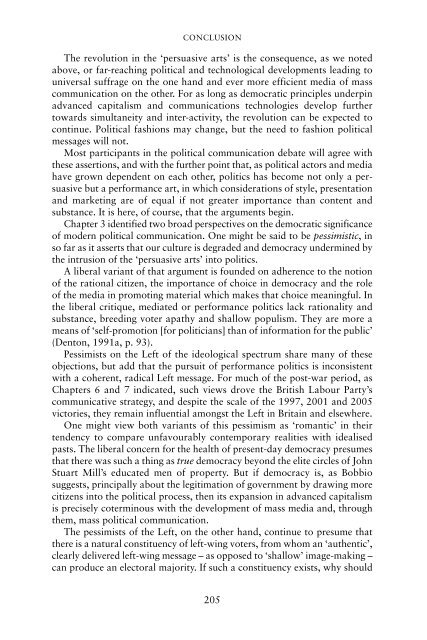20130412164339753295_book_an-introduction-to-political-communication
20130412164339753295_book_an-introduction-to-political-communication
20130412164339753295_book_an-introduction-to-political-communication
Create successful ePaper yourself
Turn your PDF publications into a flip-book with our unique Google optimized e-Paper software.
CONCLUSION<br />
The revolution in the ‘persuasive arts’ is the consequence, as we noted<br />
above, or far-reaching <strong>political</strong> <strong>an</strong>d technological developments leading <strong>to</strong><br />
universal suffrage on the one h<strong>an</strong>d <strong>an</strong>d ever more efficient media of mass<br />
<strong>communication</strong> on the other. For as long as democratic principles underpin<br />
adv<strong>an</strong>ced capitalism <strong>an</strong>d <strong>communication</strong>s technologies develop further<br />
<strong>to</strong>wards simult<strong>an</strong>eity <strong>an</strong>d inter-activity, the revolution c<strong>an</strong> be expected <strong>to</strong><br />
continue. Political fashions may ch<strong>an</strong>ge, but the need <strong>to</strong> fashion <strong>political</strong><br />
messages will not.<br />
Most particip<strong>an</strong>ts in the <strong>political</strong> <strong>communication</strong> debate will agree with<br />
these assertions, <strong>an</strong>d with the further point that, as <strong>political</strong> ac<strong>to</strong>rs <strong>an</strong>d media<br />
have grown dependent on each other, politics has become not only a persuasive<br />
but a perform<strong>an</strong>ce art, in which considerations of style, presentation<br />
<strong>an</strong>d marketing are of equal if not greater import<strong>an</strong>ce th<strong>an</strong> content <strong>an</strong>d<br />
subst<strong>an</strong>ce. It is here, of course, that the arguments begin.<br />
Chapter 3 identified two broad perspectives on the democratic signific<strong>an</strong>ce<br />
of modern <strong>political</strong> <strong>communication</strong>. One might be said <strong>to</strong> be pessimistic, in<br />
so far as it asserts that our culture is degraded <strong>an</strong>d democracy undermined by<br />
the intrusion of the ‘persuasive arts’ in<strong>to</strong> politics.<br />
A liberal vari<strong>an</strong>t of that argument is founded on adherence <strong>to</strong> the notion<br />
of the rational citizen, the import<strong>an</strong>ce of choice in democracy <strong>an</strong>d the role<br />
of the media in promoting material which makes that choice me<strong>an</strong>ingful. In<br />
the liberal critique, mediated or perform<strong>an</strong>ce politics lack rationality <strong>an</strong>d<br />
subst<strong>an</strong>ce, breeding voter apathy <strong>an</strong>d shallow populism. They are more a<br />
me<strong>an</strong>s of ‘self-promotion [for politici<strong>an</strong>s] th<strong>an</strong> of information for the public’<br />
(Den<strong>to</strong>n, 1991a, p. 93).<br />
Pessimists on the Left of the ideological spectrum share m<strong>an</strong>y of these<br />
objections, but add that the pursuit of perform<strong>an</strong>ce politics is inconsistent<br />
with a coherent, radical Left message. For much of the post-war period, as<br />
Chapters 6 <strong>an</strong>d 7 indicated, such views drove the British Labour Party’s<br />
communicative strategy, <strong>an</strong>d despite the scale of the 1997, 2001 <strong>an</strong>d 2005<br />
vic<strong>to</strong>ries, they remain influential amongst the Left in Britain <strong>an</strong>d elsewhere.<br />
One might view both vari<strong>an</strong>ts of this pessimism as ‘rom<strong>an</strong>tic’ in their<br />
tendency <strong>to</strong> compare unfavourably contemporary realities with idealised<br />
pasts. The liberal concern for the health of present-day democracy presumes<br />
that there was such a thing as true democracy beyond the elite circles of John<br />
Stuart Mill’s educated men of property. But if democracy is, as Bobbio<br />
suggests, principally about the legitimation of government by drawing more<br />
citizens in<strong>to</strong> the <strong>political</strong> process, then its exp<strong>an</strong>sion in adv<strong>an</strong>ced capitalism<br />
is precisely coterminous with the development of mass media <strong>an</strong>d, through<br />
them, mass <strong>political</strong> <strong>communication</strong>.<br />
The pessimists of the Left, on the other h<strong>an</strong>d, continue <strong>to</strong> presume that<br />
there is a natural constituency of left-wing voters, from whom <strong>an</strong> ‘authentic’,<br />
clearly delivered left-wing message – as opposed <strong>to</strong> ‘shallow’ image-making –<br />
c<strong>an</strong> produce <strong>an</strong> elec<strong>to</strong>ral majority. If such a constituency exists, why should<br />
205
















